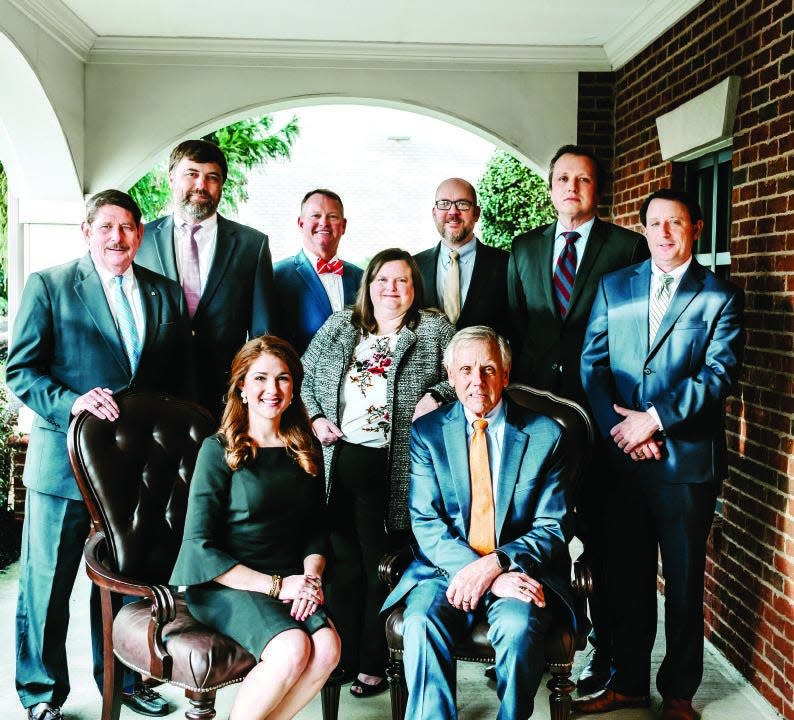Law, Community And A Bow Tie, Too
When Allen Clardy walks into the lobby of his firm’s office building, he occasionally startles clients.
They’re surprised to find themselves face-to-face with the guy from the Clardy Law Firm television commercials.
“I always laugh. This is where I work. I'm not in Florida or Charleston or anywhere else,” says Clardy, who has led the personal injury firm that bears his name since 2010.
“I live five minutes from this office.” The firm is located at 872 S. Pleasantburg Drive. “This is my community.”
Clients and others might not recognize him at all if he isn’t wearing his trademark bow tie.
“People want me to wear the bow tie all the time,” Clardy says. “I wore the bow ties for the first few commercials, and it just stuck.”
Bottom line: Whether he’s wearing a tie, appearing in a commercial, or walking through the lobby, Clardy is a working attorney.
“I’m here with clients, and I'm preparing for depositions and reading transcripts and preparing outlines for cross-examinations and trials. Doing legal work, I am a little more casual. I take off my tie. But I've got plenty of bow ties when I need them,” he says.
In addition to Clardy, the firm has eight attorneys: Genevieve Mendes Weaver, who appears in television ads with Clardy; David Hartman, who has been with the firm since it was founded; John Creech, who is a certified mediator; Tim Nowacki, a decorated Air Force veteran; Andrew F. Carson; Brad B. Easterling; Dana M. Lahey; and David Hill Keller, a Marine veteran and certified mediator who left retirement to work with veterans who may have been exposed to chemicals in the drinking water at Camp Lejeune in North Carolina.
“We have talented attorneys – from Notre Dame Law, Miami Law, Clemson Honors College, a Furman University linebacker … They are good and energetic, and they do a great job and bring different talents and insights,” Clardy says.
“We've got a tagline: Local. Trusted,” he says. “We’re neighbors. People know that they can come in and see us, that we pick up the phone, that you can call the person whose name is on the sign.
About two dozen paralegals, legal assistants, investigators and administrative staff round out the team.
“We are a family,” says Clardy, who has been practicing law in Greenville since 1995. “We all work together. We’re still growing.”
The firm handles only injury cases.
“In that realm, there are a lot of different cases. It's work injuries and injuries where someone else is at fault. How that fault occurs: That's what we do,” Clardy says.
“It varies from a tractor-trailer case, which involves interstate commerce law and trucking. To death cases. Car and motorcycle accidents. Premises liability cases. Workers’ compensation. We've got an entire department that does nothing but workers’ compensation.”
Though television commercials, oft-repeated jokes and popular culture might imply that clients are just trying to enrich themselves with personal injury lawsuits, the truth is far different, Clardy says.
“People who receive big settlements or verdicts have been hurt badly or have lost loved ones. Something terrible has happened in this person's life. So, the law compensates for this tragedy that's occurred,” he says.
“I've written a lot of big checks in my career, but I've never written one where the person was happy to get that check in trade for what occurred to their life. Because it's bad. There’s an old saying: Health is everything. I can tell you – doing this – that’s 100% true. You can't trade that, and you certainly can't sell that.”
Clardy acknowledges that some television advertising sends the wrong message.
“The idea that people are trying to get the big money: There will always be people who try to take advantage of the system. But it’s not easy to go against an insurance company. It's not like insurance companies are throwing money at me. It takes work, and it takes knowledge.”

Advertising by attorneys has been allowed since the late 1970s but wasn’t common for years.
“When I first started practicing law in the mid-’90s, a very small number of injury attorneys advertised,” he says.
An attorney who did was Clardy’s one-time partner, the late Dick James.
But back then, advertising in the phone book was as effective as anything, Clardy says.
“I have never been uncomfortable with advertising. I've never looked down on it if it was done professionally.”
Clardy is no stranger to sales. His father owned Greenville Auto Auction and sold the business while his son was in college – which began Clardy’s journey into law.
Studying political science and history at Francis Marion University in Florence, Clardy was the first in his family to attend college and assumed he would work in his dad’s business.
But Clardy says a “really kind” professor, Dr. Neal D. Thigpen, encouraged him to study law. His parents urged him to get some first-hand experience from his father’s attorney and friend, Maurice Ashmore.
“It was Maurice Ashmore, Neil Rabon, and Amy Sutherland, who went on to become a family court judge,” Clardy says. “I worked for them for six months, and I loved it.”
After law school, Clardy’s first job was with the same firm, which by then included Henry Sullivan.
Clardy says he didn’t set out to practice personal injury law.
“You have some success. It starts to build. It just evolved. Now, I'm almost 30 years into it.”
Clardy says he has enjoyed the work, then and now.
“I enjoy people,” he says. “We try to follow the golden rule here. You return the client's call. You communicate with clients. We try to understand and empathize with our clients and create that relationship. If you treat people like you want to be treated, it'll work, and you'll be fine.”
This article originally appeared on Greenville News: Law, Community And A Bow Tie, Too

